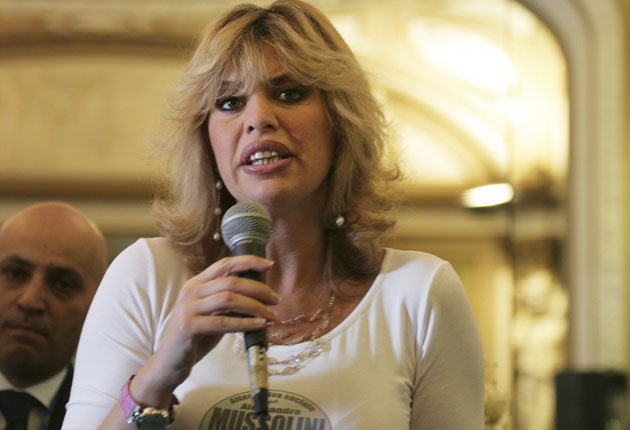Mussolini's granddaughter blocks movie that labels her a 'whore'
Venice Film Festival entry about immigration draws the ire of controversial figure

The Granddaughter of the Fascist dictator Benito Mussolini has blocked the release of a film which has received critical acclaim at the Venice Film Festival because a character in it refers to her as the "Mussolini whore" who wants all Romanians to be killed.
Alessandra Mussolini, a right-wing politician and a former actress, threatened the distributors of the film Francesca with legal action. She is demanding that the offending dialogue is removed or she says she will attempt to block it from nationwide release in Italy, due next month.
The lines in the film she takes issue with are spoken by an elderly Romanian character who is attempting to dissuade his granddaughter from leaving Romania for Italy. But Ms Mussolini, who in 2007 caused a political outcry by claiming that all Romanians living in Italy were "criminals", faxed a letter to the distribution company Fandango and festival organisers. In it she threatened to start legal proceedings for defamation unless the dialogue was either cut or the film cancelled from the festival's schedule, where it is a contender for the Orizzonti award, second to the festival's main Golden Lion prize.
She has declared that she wants to ban the movie from being distributed in Italy. "If what I've read about the movie is true, my lawyer said he could ask, apart from damages, for it to be banned. Its tone is unacceptable, even if it's art," she was quoted as saying by Italian newspapers.
The Major of Verona also waded into the row, claming his reputation too could suffer, as one Romanian character in the film says "they (the Italians) have declared Verona free of Romanians".
Two public screenings of Francesca at Venice have been cancelled, but filmmakers are attempting to settle the dispute to ensure nationwide release. The row has ignited fierce debate in both Italy and Romania, featuring prominently in the newspapers in both countries. The film's premiere received loud cheers and applause from critics.
It was written, directed and produced by the award-winning filmmaker, Bobby Paunescu. Speaking to The Independent, he suggested that Ms Mussolini – who was not at the film's premiere – had clearly missed the point.
Mr Paunescu said the film was a "critique" of the xenophobic treatment of immigrants in Italy and accused Ms Mussolini of "intimidation". He said he was angry that the public have not been able to see it so far. The attempt to block its release was "dangerous", he added.
"What is important about my film is its discussion of the Romanian community. Twenty per cent of the population in the last 10 years have emigrated, the majority to Italy, which has become the 'promised land' for many Romanians. Yet at the same time, there is a negative perception about the country. The film is not an attack on anyone. I'm trying to highlight the prejudices. I think the film creates a valid debate."
The producer, who won plaudits for his award-winning film, The Death of Mr Lazarescu in 2005, grew up in Italy which he regards as his "second home."
Domenico Procacci, the head of Fandango, said his company was determined to protect artistic independence and the freedom of expression.
Ms Mussolini, 46, was the leader of the conservative Social Action party until 2008. A niece of Sofia Loren, she was first elected to parliament in 1992 as a member of the neo-fascist Movimento Sociale Italiano (MSI).
In 2006, she responded to claims by the transgender Italian politician, Vladimir Luxuria, that she was a "fascist" by reportedly saying: "Meglio fascista che frocio" – it is better to be a fascist than a faggot.
Join our commenting forum
Join thought-provoking conversations, follow other Independent readers and see their replies
Comments
Bookmark popover
Removed from bookmarks